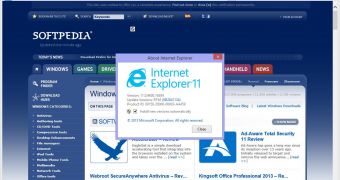Microsoft continues to advertise Windows 8.1 as the right operating system for everyone, with the company now claiming that IE11 makes it easier for blind and visually impaired users to browse the Internet.
In just a few words, Redmond has implemented several new technologies capable of working with screen readers, such as its very own Windows Narrator.
“With the editing and input improvements in IE11, screen readers can better inform users about the current content of an editing region, and typing with East Asian languages using an Input Method Editor (IME) is now easier. With these changes, IE11 improves the experience of the next generation of cloud-based applications for a growing portion of the world’s population,” the company said.
For example, IE11 now comes with a built-in auto-correct tool, so it automatically takes care of misspelled words.
In addition, the browser has been designed in such a way that pressing backspace also notifies the screen reader which letter was deleted, so it can be announced.
“When reading or writing an email or other Web content, users need to understand the formatting of the message, not just the raw text. IE11 provides more detailed notifications to screen readers, so users can better understand the content they are reading or editing,” Microsoft noted.
“For example, Microsoft Narrator says “bold” and “end bold” to let the user know that a section of text was emphasized with bold styling. You can try it out for yourself in Microsoft Narrator by enabling Verbose Mode using Caps Lock + A. This video demonstrates how Microsoft Narrator reads formatting information.”
Internet Explorer 11 is the default browser in Windows 8.1, but it’s also available as an optional download for Windows 7 users. Microsoft’s new operating system is set to make its debut on October 18, with Windows 8 adopters to be allowed to download it from the Store free of charge.

 14 DAY TRIAL //
14 DAY TRIAL //